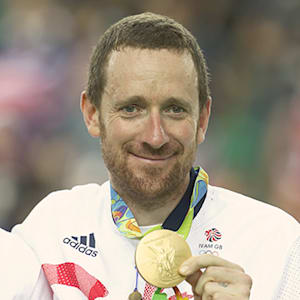Bradley WIGGINS
バイオグラフィー
Excelling on road and track, Bradley Wiggins is Great Britain’s most decorated Olympian with eight medals, just ahead of fellow cyclists Chris Hoy and Jason Kenny. Wiggins stepped up to the podium at every Olympic Games from Sydney 2000 to Rio 2016, collecting five golds along the way.
Big ambitions
Born in Ghent (BEL), Bradley Wiggins is the son of late Australian cyclist Gary Wiggins, a successful six-day racer in the 1970s and 80s. Wiggins Jr moved to London with his British mother, Linda, when he was a boy and took up cycling, inspired by the sight of Chris Boardman winning individual pursuit gold at Barcelona 1992. Wiggins, who competed in his first race at the age of 12, was so convinced of his abilities that he told one of his teachers: “I'm going to be Olympic champion. I'm going to wear the yellow jersey in the Tour de France.”
A first Olympic medal
The ambitious young cyclist, who would later be mentored by Boardman, honed his skills at the Herne Hill Velodrome in London, which had been built for the 1948 Olympic Games, and specialised in the madison and the pursuit, an event in which he won the 1998 world junior title, at the age of 18. He then got his first taste of the Olympics at Sydney 2000, where he collected bronze in the team pursuit.
A prophesy fulfilled
Wiggins turned professional in 2001, riding for Française des Jeux and Crédit Agricole. Making his second Olympic appearance at Athens 2004, he proved himself a worthy successor to Boardman by winning a total of three medals: gold in the individual pursuit, silver in the team pursuit and bronze in the madison. Following the Games, Wiggins decided to switch to the road, only to return to the track to win individual and team pursuit world titles in Palma de Mallorca (ESP) in 2007. A year later he appeared at his third Games in Beijing, where he became the first rider ever to retain the individual pursuit title. He went on to win the team pursuit crown, with the GB four beating Denmark by 6.7 seconds in the gold medal match and setting a new world record of 3:53.314 in the process. Now the proud owner of six Olympic medals, three of them gold, Wiggins had pulled level with Steve Redgrave as his country’s most successful Olympian of all time.
Taking on the Tour
Turning his attention back to the road, Wiggins came close to Tour de France glory in 2009, taking third place on the podium. He was not so fortunate in the 2011 race, when he had to retire after breaking a collarbone. The following year would be an entirely different story for the British rider, however, as he tasted both Tour and Olympic glory in the space of a few short weeks.
Annus mirabilis
After donning the yellow shirt for the first time on stage seven of the 2012 Tour de France, Wiggins stayed in it all the way to the finish line on the Champs Elysées, becoming the first British cyclist ever to win the great event. That rare achievement made “Wiggo” as much of a hero with French cycling fans as it did with his compatriots. Famed for his dry wit, Wiggins then achieved a piece of sporting history a few weeks later at London 2012, where he took the honours in the individual time trial to become the first man to win the Tour de France and Olympic gold in the same year.
Speaking after his magnificent victory on home tarmac, achieved by a margin of 42 seconds from Germany’s Tony Martin, Wiggins said: “It's been an amazing six weeks. This was the plan. I've answered all the questions in the last six weeks.”
More gold in Rio
After being crowned a world road time trial champion for the first time in Ponferrada (ESP) in 2014, Wiggins then went back to the track with the aim of contesting his fifth Games at Rio 2016. His preparations included a successful attempt at the world hour record at the Lee Valley VeloPark in June 2015, with the British legend riding a new best of 54.526km. A seventh track world title – in the madison with Mark Cavendish – then came his way at the same venue in March 2016, and was followed by selection for the Olympic team pursuit in Rio. The British quartet of Ed Clancy, Steven Burke, Owain Doull and the 36-year-old Wiggins kicked off by setting a new world record of 3:50.570 in the first round before going for gold against a determined Australian four in the final. Though the Aussies bettered Great Britain’s gold medal winning time at London 2012, they were no match for the class of 2016, who eclipsed their own world record with a time of 3:50.265, equating to an average of 62.356 km/h over the four-kilometre standing-start race. As irreverent as ever, Wiggins stuck his tongue out on the podium, much to the amusement of his team-mates, and raised the fingers on his right hand to signify his five golds and five Olympic appearances.
特集
Bradley WIGGINS
リプレイ
オリンピックでの結果
Athlete Olympic Results Content
You may like

